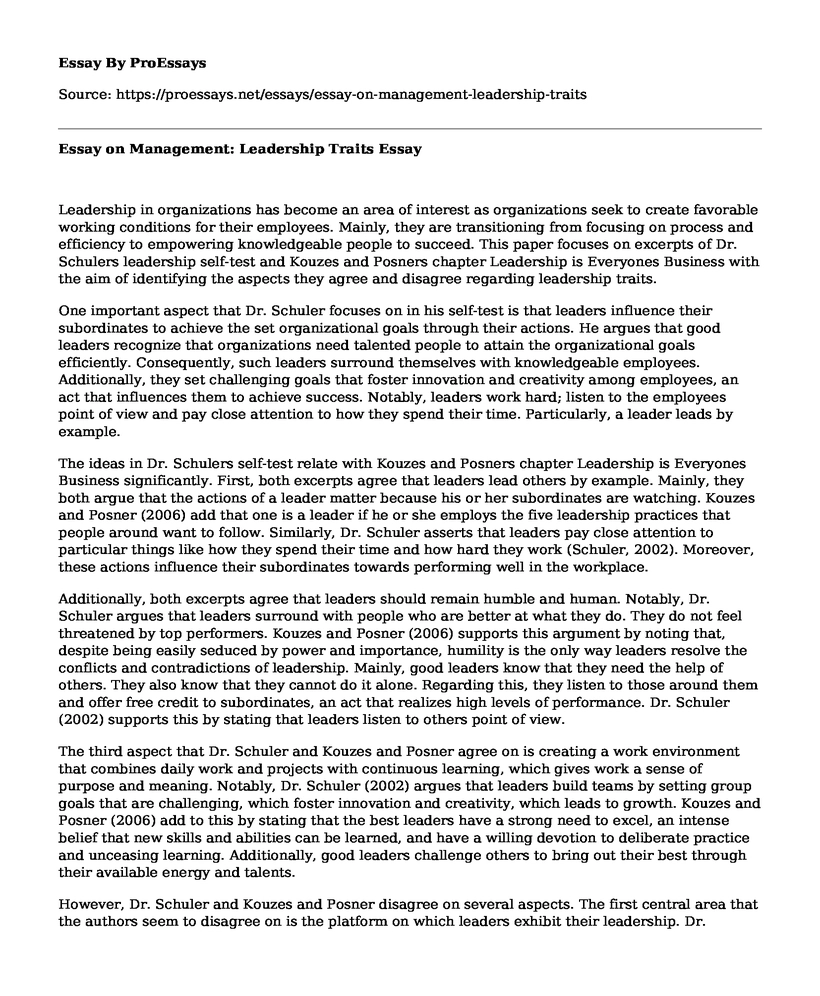Leadership in organizations has become an area of interest as organizations seek to create favorable working conditions for their employees. Mainly, they are transitioning from focusing on process and efficiency to empowering knowledgeable people to succeed. This paper focuses on excerpts of Dr. Schulers leadership self-test and Kouzes and Posners chapter Leadership is Everyones Business with the aim of identifying the aspects they agree and disagree regarding leadership traits.
One important aspect that Dr. Schuler focuses on in his self-test is that leaders influence their subordinates to achieve the set organizational goals through their actions. He argues that good leaders recognize that organizations need talented people to attain the organizational goals efficiently. Consequently, such leaders surround themselves with knowledgeable employees. Additionally, they set challenging goals that foster innovation and creativity among employees, an act that influences them to achieve success. Notably, leaders work hard; listen to the employees point of view and pay close attention to how they spend their time. Particularly, a leader leads by example.
The ideas in Dr. Schulers self-test relate with Kouzes and Posners chapter Leadership is Everyones Business significantly. First, both excerpts agree that leaders lead others by example. Mainly, they both argue that the actions of a leader matter because his or her subordinates are watching. Kouzes and Posner (2006) add that one is a leader if he or she employs the five leadership practices that people around want to follow. Similarly, Dr. Schuler asserts that leaders pay close attention to particular things like how they spend their time and how hard they work (Schuler, 2002). Moreover, these actions influence their subordinates towards performing well in the workplace.
Additionally, both excerpts agree that leaders should remain humble and human. Notably, Dr. Schuler argues that leaders surround with people who are better at what they do. They do not feel threatened by top performers. Kouzes and Posner (2006) supports this argument by noting that, despite being easily seduced by power and importance, humility is the only way leaders resolve the conflicts and contradictions of leadership. Mainly, good leaders know that they need the help of others. They also know that they cannot do it alone. Regarding this, they listen to those around them and offer free credit to subordinates, an act that realizes high levels of performance. Dr. Schuler (2002) supports this by stating that leaders listen to others point of view.
The third aspect that Dr. Schuler and Kouzes and Posner agree on is creating a work environment that combines daily work and projects with continuous learning, which gives work a sense of purpose and meaning. Notably, Dr. Schuler (2002) argues that leaders build teams by setting group goals that are challenging, which foster innovation and creativity, which leads to growth. Kouzes and Posner (2006) add to this by stating that the best leaders have a strong need to excel, an intense belief that new skills and abilities can be learned, and have a willing devotion to deliberate practice and unceasing learning. Additionally, good leaders challenge others to bring out their best through their available energy and talents.
However, Dr. Schuler and Kouzes and Posner disagree on several aspects. The first central area that the authors seem to disagree on is the platform on which leaders exhibit their leadership. Dr. Schulers self-test mainly focuses on leadership practices in managerial jobs. Conversely, Kouzes and Posner (2006) do not focus on leaders in the organizational setting because they claim that leadership is not about position or the title, nor is it about corporate power or authority. Mainly, they point out that anyone can be a leader, even an employee in his or her job level, a coach, a teacher, or a family member.
Another subject that Dr. Schuler and Kouzes and Posner disagree on is the practice of process and efficiency. Notably, Dr. Schuler (2002) argues that leaders make people grow rather than focusing on process and efficacy, which is a characteristic for managers. However, Kouzes and Posner (2006) argue that a leader has to keep learning to grow. They point out that what differentiates expert performers and good performers is the hours of deliberate practice. Furthermore, it is through this practice that they gain efficiency in leading in their different areas of specialization.
Conclusion
To conclude, it is clear that Dr. Schuler and Kouzes and Posner thoughts on leadership traits are similar. Notably, the authors agree that leaders influence their subordinates through their actions, which motivates them to work hard and spend their time constructively. Similarly, the authors observe that a good leader seeks top performers in their areas of specialization, does not feel threatened by their expertise because he or she is humble, and understands that they possess the necessary talent. Consequently, the leader attains high organizational performance. Nevertheless, Kouzes and Posner points out that one can exhibit leadership traits in any platform. Mainly, they show that anyone can be a leader. It does not have to be a person in a position of power.
References
Kouzes, J. M., & Posner, B. Z. (2006). The leadership challenge (Vol. 3). John Wiley & Sons.
Schuler, A. J. (2002). Are You A Leader? Part II: Leadership Self Test Answers and Discussion
Cite this page
Essay on Management: Leadership Traits. (2021, Apr 08). Retrieved from https://proessays.net/essays/essay-on-management-leadership-traits
If you are the original author of this essay and no longer wish to have it published on the ProEssays website, please click below to request its removal:
- Organizational Change Paper Example
- Organization Theory, Behavior, Organic Organization, Mechanic Organization Mission and Vision Statement
- Advice to MB on the Potential Liability to the Unfair Dismissal
- Tangible and Intangible Resources Possessed by Ford Paper Example
- How (Un)ethical Are You: Hiring Department Essay
- Research Paper on Board of Directors & CEOs: Key Players in Ethical Corporate Leadership
- Essay Example on DuPont Model: Essential Financial Analysis Framework







